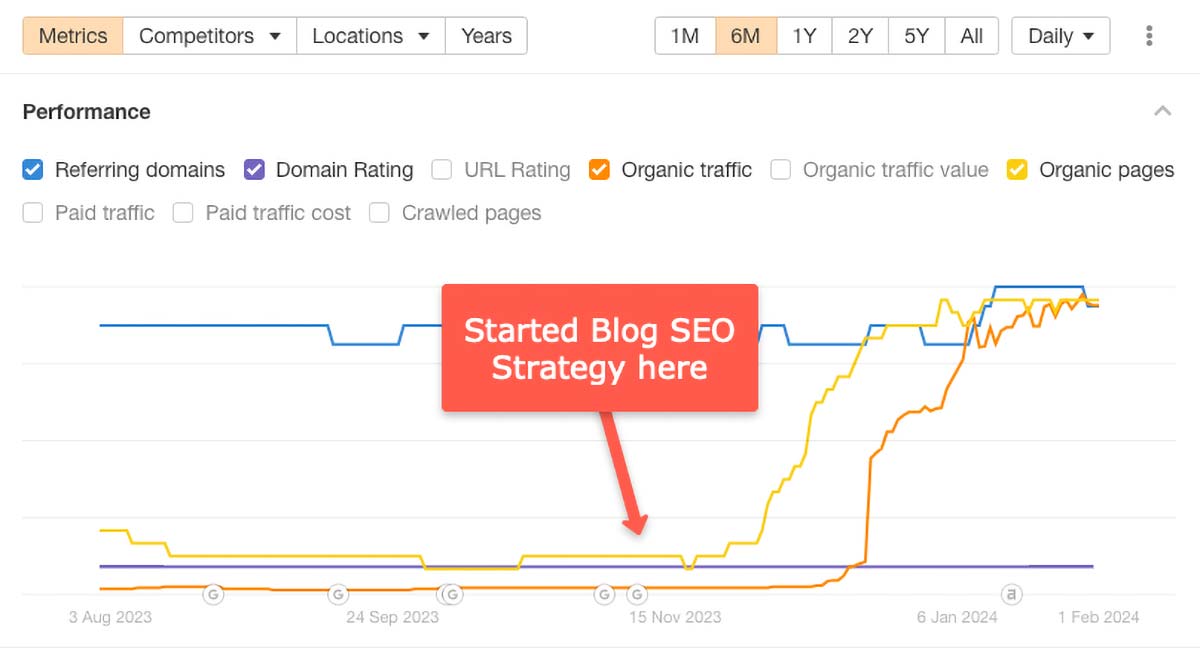Are you wondering how to boost your website’s search engine optimization (SEO) through blogging? In this article, we will explore the ways in which blogging can benefit your SEO efforts, including increasing website traffic, generating backlinks, and improving website authority.
- Does Blogging Help SEO?
- What is Blogging?
- How Can Blogging Help With SEO?
- How to Optimize Your Blog for Search Engine Optimization?
- What Are the Best Practices for Blogging and SEO?
- Frequently Asked Questions
- Enhancing Your Blog SEO
- Crafting a Comprehensive SEO Strategy
- How We Can Help With Your SEO
We will also provide practical tips on how to optimize your blog for SEO, such as choosing relevant keywords, creating engaging content, and utilizing internal and external links. We will discuss the best practices for blogging and SEO, including the use of long-tail keywords, mobile-friendly blog design, and guest blogging.
So, if you want to take your website to the next level, keep reading to find out how blogging can help improve your SEO.
Key Takeaways:
- Blogging is a powerful tool to improve SEO and drive more traffic to your website.
- Creating high-quality content and using relevant keywords can boost your blog’s ranking in search engine results.
- Optimizing your blog with backlinks, internal/external links, and social media sharing can further enhance its SEO performance.
 Does Blogging Help SEO?
Does Blogging Help SEO?
Yes, blogging significantly helps SEO by providing fresh, relevant content that search engines like, which can improve a website’s visibility and ranking.
Regularly updated blogs with high-quality, keyword-optimized posts contribute to a website’s authority and relevance, helping to attract more organic traffic and engage users effectively. By incorporating a variety of content types, such as how-to guides, industry insights, and case studies, bloggers can address a wider range of search queries.
Furthermore, engaging with your audience through comments and social media shares can increase the reach of your content, further enhancing your SEO efforts. This proactive approach to blogging not only enriches your content strategy but also strengthens your overall digital marketing efforts, making it a key component of a successful SEO strategy.
What is Blogging?
Blogging, a cornerstone of digital marketing and content marketing, is the process of creating and publishing content on a blog.
This practice plays a crucial role in shaping brand promotion, audience engagement, and thought leadership in the contemporary digital space. With its ability to provide valuable insights, information, and entertainment, blogging is an effective tool for establishing a brand’s authority and credibility in a niche market.
It fosters direct interaction with the target audience, creating a sense of community and trust. As a result, it has become a critical element of modern marketing strategies, enabling companies to connect with their customers on a more personal level.
 How Can Blogging Help With SEO?
How Can Blogging Help With SEO?
Blogging plays a pivotal role in enhancing SEO strategies, contributing to improved search engine rankings and increased online visibility through the creation and optimization of blog posts and content marketing efforts.
Mastering blog SEO and adhering to SEO best practices with every blog post are essential for maximizing the impact of your content. By focusing on optimizing blog content for search engine optimization, you lay the foundation for a more discoverable, engaging, and effective online presence.
Understanding how to write a blog that aligns with SEO principles is crucial. Each piece of blog content is an opportunity to boost your site’s visibility and drive targeted traffic, making every blog post a strategic element of your overall marketing efforts.
This strategic approach to blog content creation not only helps SEO but sets the stage for the next crucial step: optimizing your blog for search.
Optimizing Your Blog for Search
By applying on-page SEO techniques to optimize your blog content, you ensure that each post contributes to your site’s overall SEO performance, making your blog an invaluable tool to help your business rank higher in search engine results.
Regularly publishing new blog posts keeps your content fresh and engaging, which is a key factor in optimizing your blog for search. This relentless pursuit of quality and relevance in blogging can significantly help you rank higher, driving more organic traffic to your site and enhancing your business’s online presence.
Increases Website Traffic
 Integrating a blog into your local business’s website significantly enhances its online visibility, facilitating easier discovery by potential customers. This digital strategy is particularly effective for small businesses aiming to make an impact within their local communities.
Integrating a blog into your local business’s website significantly enhances its online visibility, facilitating easier discovery by potential customers. This digital strategy is particularly effective for small businesses aiming to make an impact within their local communities.
An effective SEO strategy can help increase traffic to your website. By crafting content that echoes the interests and concerns of your local customers, your blog becomes a magnet for engagement. This approach not only fosters a stronger connection with your audience but also amplifies your presence in local search results.
Each well-thought-out blog post serves as a beacon, attracting more visitors to your website. This increased web traffic opens the door to new business opportunities, turning readers into customers.
Consistency is key when it comes to blogging. Regular updates signal to your audience—and search engines—that your website is a go-to source for fresh, relevant content. This commitment to regular posting builds trust and encourages both new and returning visitors, propelling your business towards sustained growth.
Generates Backlinks
One of the key benefits of blogging for SEO is its ability to generate valuable backlinks, a crucial component of SEO techniques and best practices that directly impact search engine rankings.
This acts as a vote of confidence from other websites, signaling to search engines that your content is credible and worthy of being linked to.
Quality backlinks also enhance the authority and trustworthiness of your website in the eyes of search engine algorithms.
Through consistent, high-quality blogging, you can attract organic backlinks from relevant and authoritative sources, further elevating your website’s visibility and credibility in search engine results pages.
Improves Website Authority
Blogging contributes to improving website authority by implementing SEO writing practices, enhancing EAT (Expertise, Authoritativeness, Trustworthiness) and leveraging SEO plugins for optimization.
SEO writing involves strategically incorporating relevant keywords and entities to increase the visibility and relevance of blog content to search engines. This ultimately improves website ranking and attracts more organic traffic. Adhering to EAT principles ensures that the blog content demonstrates expertise, authority, and trustworthiness. This establishes credibility within the industry and among the target audience.
Focusing on elements important for SEO can significantly help search engines better understand and rank your blog content. By emphasizing the creation of blog articles designed for search engines, bloggers can enhance their SEO and rankings effectively.
This involves a strategic approach to content creation, where every blog post is optimized to meet the specific needs and behaviors of search engine algorithms. Through such dedicated efforts, bloggers can ensure their content is not only rich in quality and information but also structured in a way that optimizes visibility and authority in a competitive digital landscape.
By utilizing SEO plugins, bloggers can streamline the optimization process. This includes tasks such as adding meta tags and descriptions, as well as internal linking. These efforts further enhance the overall website performance and authority.
Increases Keyword Ranking
Blogging aids in increasing keyword ranking by targeting specific keywords, optimizing blog content, and aligning with SEO strategies for improved search engine visibility.
Crafting compelling content and targeting specific keywords can greatly enhance a blogger’s website relevance and authority. By implementing solid optimization techniques, such as optimizing meta descriptions, headings, and images with relevant keywords, bloggers can improve their search engine rankings. This alignment with SEO ensures that search engines recognize the value and relevance of the blog’s content, leading to better visibility and higher rankings for targeted keywords.
Blogging Can Improve Your SEO, the Proof is in the Numbers
Blogging provides numerous opportunities to improve your website’s SEO, and it has become an essential practice for digital marketers.
While the search engines’ algorithms can be tricky to fully understand, the numbers speak for themselves. Companies with active blogs are indexed by the search engines 434% more often than those without active blogs. As a result, companies with blogs generate 55% more website visits than those without.
This increased traffic directly results in more growth for your business. Businesses with successful blogs generate an average of 67% more leads every month. These leads cost an average of 62% less than those generated through outbound methods, such as cold calling.
Here are a few more numbers:
Companies that blog receive 97% more links to their website.
Companies with active blogs are indexed by the search engines 434% more often than those without active blogs and generate 55% more website visits.
Businesses with successful blogs generate 67% more leads every month, which costs 62% less than leads generated through outbound methods.
77% of internet users regularly read blogs.
Social media sites and blogs account for 23% of time spent online.
Blogging is one of the simplest, cost-effective and proven ways to improve your SEO and grow your business, especially as the digital world becomes increasingly crowded and competitive.
 How to Optimize Your Blog for Search Engine Optimization?
How to Optimize Your Blog for Search Engine Optimization?
Optimizing your blog for SEO involves leveraging SEO tools, refining your blog content, and implementing strategies to ensure maximum visibility on search engines like Google.
1. Choose Relevant and High-Quality Keywords
Selecting relevant and high-quality keywords is essential for effective blog SEO, ensuring visibility and recognition by search engines like Google.
These keywords act as the bridge connecting your content to the right audience. When chosen wisely, they enhance the search engine optimization (SEO) efforts by making your blog more discoverable to potential readers.
The power of keywords lies in their ability to attract organic traffic to your site, boosting its visibility and credibility. By incorporating keywords strategically, your content becomes more relevant and valuable in the eyes of search engines, which in turn improves its ranking and exposure.
2. Create Engaging and Valuable Content
Creating engaging and valuable content is a cornerstone of blog optimization, contributing to improved SEO and the overall impact of your blog.
By producing high-quality content that resonates with your audience, you increase the likelihood of attracting organic traffic, gaining backlinks, and enhancing brand visibility.
This, in turn, leads to improved search engine rankings and credibility within your niche. Compelling content encourages social sharing and fosters a sense of trust and authority, establishing your blog as a reputable source of information.
It is essential to incorporate relevant keywords naturally within your content to ensure contextual relevance and align with the search intent of your target audience.
3. Use Internal and External Links
Incorporating internal and external links in your blog content provides significant SEO benefits, enhancing the overall impact and visibility of your blog.
Internal links play a crucial role in guiding visitors through your website, improving user experience, and establishing a logical hierarchy for search engine crawlers.
By strategically placing internal links to relevant articles, you can strengthen the authority of your website and increase the time visitors spend on your pages.
Similarly, external links to high-quality, reputable websites not only add value to your content but also signal to search engines that your blog is part of a valuable network of information.
This can contribute to higher search engine rankings and increased organic traffic.
4. Optimize Meta Data and Alt Text
Optimizing meta data and alt text in your blog enhances its SEO performance, contributing to improved visibility and strategic implementation of Shopify SEO tactics.
Implementing effective meta data involves crafting relevant and compelling title tags, meta descriptions, and URL structures.
This allows search engines to understand the context of your content, boosting its visibility and attracting potential readers.
Additionally, optimized alt text for images not only improves accessibility for visually impaired users but also provides search engines with valuable information, enhancing the overall SEO of your blog.
Both meta data and alt text optimization play a crucial role in aligning your content with SEO best practices and boosting its ranking in search results.
5. Utilize Social Media Sharing
Utilizing social media sharing for your blog content is instrumental in enhancing its visibility, engagement, and recognition by Google and other search engines.
When your blog posts are shared on popular social media platforms such as Facebook, Twitter, and LinkedIn, they reach a wider audience, increasing the likelihood of attracting new readers and potential customers.
The engagement generated through likes, comments, and shares contributes to establishing your blog as a credible and influential source within your niche. Search engines value the social signals generated by content shared on social media, which can improve your search engine rankings. This, in turn, leads to increased organic traffic and brand recognition.
 What Are the Best Practices for Blogging and SEO?
What Are the Best Practices for Blogging and SEO?
Implementing best practices for blogging and SEO involves strategic selection of blog topics, optimization for search engines, and leveraging the expertise of SEO services to ensure maximum impact.
Consistency in Blogging
Maintaining consistency in blogging is vital for new and existing blogs, ensuring regular updates and content refreshes to optimize search engine recognition and ranking.
Consistency in blogging not only keeps the audience engaged but also greatly impacts the visibility of the blog across search engines.
The regular updates and content refreshes play a crucial role in establishing the credibility of the blog, thereby enhancing its search engine ranking. When a blog is consistently updated with relevant keywords and entities, it helps in providing a more comprehensive and valuable resource for the audience. This, in turn, leads to improved user experience and increased recognition by search engines.
Use of Long-Tail Keywords
Incorporating long-tail keywords is advantageous for those starting to blog, providing a targeted approach to SEO and content optimization strategies.
Long-tail keywords are longer and more specific keyword phrases that visitors are more likely to use when they are closer to a point-of-purchase. This means they draw in more quality traffic, lead to higher conversion rates, and are easier to rank for due to lower competition.
By leveraging long-tail keywords, beginner bloggers can create highly targeted content that resonates with their audience, thus improving their chances of ranking higher on search engine result pages.
Mobile-Friendly Blog Design
Adopting a mobile-friendly blog design is essential for SEO efforts, ensuring compatibility and accessibility across mobile platforms to enhance user experience and search engine recognition.
With the increasing use of mobile devices, having a mobile-friendly blog design has become crucial for reaching a wider audience and improving search engine rankings.
In fact, Google’s mobile-first indexing prioritizes mobile-optimized websites, making it imperative to ensure that your blog is responsive and user-friendly on all devices.
A mobile-optimized blog design not only improves user experience but also reduces bounce rates, increases page views, and enhances the overall engagement metrics, which are all important factors considered by search engines when ranking websites.
A mobile-friendly design reflects a commitment to providing accessible and inclusive content, which is increasingly valued by search algorithms.
Regularly Update and Revise Old Blog Posts
Regularly updating and revising old blog posts is a critical SEO technique, important for maintaining relevance, improving search engine recognition, and enhancing overall SEO performance. As a matter of fact, this post is a revision of an old post.
Keeping blog posts up-to-date with the latest information and trends is crucial for signaling relevance to search engines. This can result in higher rankings and increased organic traffic for websites. Additionally, updating old content presents the opportunity to incorporate new keywords and entities, improving contextual relevance and expanding the reach of the content across various search queries.
Utilize Guest Blogging and Collaborations
Utilizing guest blogging and collaborations is instrumental in expanding your blog’s reach, building partnerships, and establishing a diverse content base to optimize search engine recognition and audience engagement.
Guest blogging provides the opportunity to tap into new audiences and networks, driving traffic to your blog and increasing your online visibility. By partnering with other bloggers and industry influencers, you can leverage their audience base and gain exposure to a larger demographic.
Collaborations also foster a sense of community and credibility within your niche, as it showcases a willingness to engage and collaborate with other experts. This not only helps in diversifying your content by incorporating different perspectives and expertise but also allows for cross-promotion, extending the organic reach of your blog.
Frequently Asked Questions
Does blogging really help with SEO?
Yes, blogging can greatly improve your SEO. By consistently creating high-quality, keyword-rich content on your blog, you can improve your website’s search engine ranking and attract more organic traffic.
Can blogging help my website rank higher on search engines?
Definitely! Blogging is an effective way to improve your website’s SEO. By regularly publishing relevant and valuable content, you can increase your website’s visibility and authority, which can lead to higher rankings on search engine results pages.
How does blogging contribute to SEO?
Blogging is one of the best ways to incorporate keywords, internal links, and external links into your website. These are all important factors that search engines consider when ranking websites. By regularly blogging, you can improve your website’s optimization and ultimately boost your SEO.
What are some tips for optimizing my blog for SEO?
First, make sure to research and use relevant keywords in your blog titles, headings, and content. Additionally, incorporate internal links to other pages on your website and external links to reputable sources. Lastly, don’t forget to regularly publish high-quality, valuable content that is shareable and engaging for your audience.
Is it important to have a blog for my website?
While it’s not mandatory, having a blog can greatly benefit your website’s SEO. Blogs allow you to regularly publish fresh, keyword-rich content that can attract more organic traffic. It also helps to establish your website as an authority in your industry, which can positively impact your SEO.
Can I use blogging to attract more backlinks to my website?
Yes, blogging is a great way to attract backlinks to your website. By creating high-quality content and promoting it through social media and other channels, you can increase the chances of other websites linking back to your blog. This can help improve your website’s authority and boost your SEO.
 Enhancing Your Blog SEO
Enhancing Your Blog SEO
Understanding the importance of blog SEO is the first step towards digital success. At Cider House Media, we specialize in refining your blog’s SEO to ensure it ranks highly on search engines. By optimizing each blog post with targeted keywords, meta descriptions, and strategic content structures, we help your business become more visible online. Our approach ensures that your blog serves as a cornerstone of your digital presence, attracting and engaging your target audience effectively.
Crafting a Comprehensive SEO Strategy
Our SEO strategy goes beyond just blog optimization. We develop a comprehensive plan that encompasses all aspects of your online presence. From on-page optimizations to backlink building, we tailor our services to meet the unique needs of your business. This holistic approach ensures that every facet of your website works together seamlessly to improve your search engine rankings, drive traffic, and increase conversions.
How We Help SEO
At Cider House Media, we believe in a hands-on approach to help SEO. Whether you’re looking to create a blog, revitalize an existing one, or enhance your website’s overall SEO, our team is ready to assist. We offer personalized consultations to understand your business goals and craft a tailored strategy that aligns with your objectives. Our local SEO services are designed to help you optimize your content and make your business stand out in local search results.
By partnering with us, you gain access to a team committed to helping you build and maintain a blog that not only reflects your brand’s voice but also drives measurable results. We keep your blog updated with relevant, engaging content that resonates with your audience and search engines alike. Let’s work together to develop a strategy for your blog that leverages the power of SEO to grow your business.



